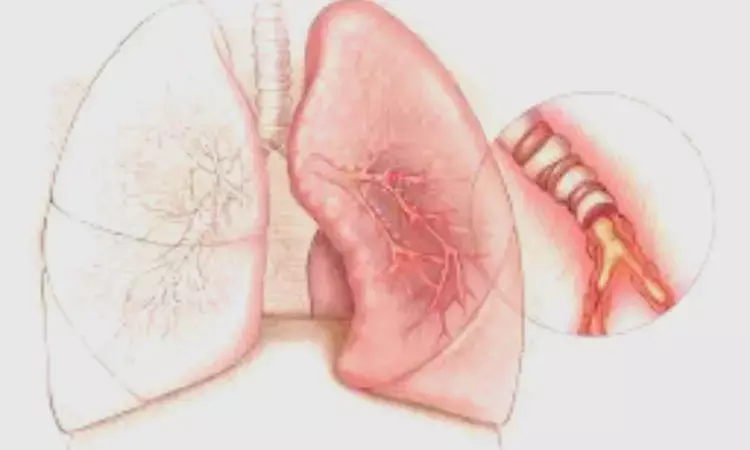- Home
- Medical news & Guidelines
- Anesthesiology
- Cardiology and CTVS
- Critical Care
- Dentistry
- Dermatology
- Diabetes and Endocrinology
- ENT
- Gastroenterology
- Medicine
- Nephrology
- Neurology
- Obstretics-Gynaecology
- Oncology
- Ophthalmology
- Orthopaedics
- Pediatrics-Neonatology
- Psychiatry
- Pulmonology
- Radiology
- Surgery
- Urology
- Laboratory Medicine
- Diet
- Nursing
- Paramedical
- Physiotherapy
- Health news
- Fact Check
- Bone Health Fact Check
- Brain Health Fact Check
- Cancer Related Fact Check
- Child Care Fact Check
- Dental and oral health fact check
- Diabetes and metabolic health fact check
- Diet and Nutrition Fact Check
- Eye and ENT Care Fact Check
- Fitness fact check
- Gut health fact check
- Heart health fact check
- Kidney health fact check
- Medical education fact check
- Men's health fact check
- Respiratory fact check
- Skin and hair care fact check
- Vaccine and Immunization fact check
- Women's health fact check
- AYUSH
- State News
- Andaman and Nicobar Islands
- Andhra Pradesh
- Arunachal Pradesh
- Assam
- Bihar
- Chandigarh
- Chattisgarh
- Dadra and Nagar Haveli
- Daman and Diu
- Delhi
- Goa
- Gujarat
- Haryana
- Himachal Pradesh
- Jammu & Kashmir
- Jharkhand
- Karnataka
- Kerala
- Ladakh
- Lakshadweep
- Madhya Pradesh
- Maharashtra
- Manipur
- Meghalaya
- Mizoram
- Nagaland
- Odisha
- Puducherry
- Punjab
- Rajasthan
- Sikkim
- Tamil Nadu
- Telangana
- Tripura
- Uttar Pradesh
- Uttrakhand
- West Bengal
- Medical Education
- Industry
CC16 predicts respiratory dysfunction and eosinophilic inflammation in severe asthma

Japan: CC16 (Club cell 16-kDa secretory protein) may help predict rapid FEV1 decline and enhanced eosinophilic inflammation in patients with severe asthma, a recent study has revealed.
In the study published in Respiratory Medicine, CC16 was shown to be inversely associated with T-helper 2 (Th2) biomarkers and the annual decline in forced expiratory volume in the first second (FEV1) in severe asthma patients. Clinicians may evaluate future and current severe asthma outcomes per baseline levels of CC16.
There are knowledge gaps in the potential role of CC16 in severe asthma phenotypes and type 2 inflammation, as well as the longitudinal effect of CC16 on exacerbation risk and pulmonary function tests in epidemiological studies. To fill this knowledge gap, Houman Goudarzi from Hokkaido University in Sapporo, Japan, and colleagues aimed to investigate whether serum CC16 is linked with eosinophilic inflammation in severe asthma patients.
They also examined the effects of the protein on the annual decline in FEV1 and exacerbation risk using a longitudinal approach. They recruited 127 patients with severe asthma from 30 hospitals/pulmonary clinics in Hokkaido, Japan. The standard error and least-square means were calculated for Th2 biomarkers and pulmonary function tests across CC16 tertiles at baseline. They did the same for the annual decline in FEV1 and asthma exacerbation with 5 and 3 years of follow-up, respectively.
The authors reported the following findings:
· The authors found that serum CC16 was inversely associated with sputum eosinophils and blood periostin in a dose-response manner.
· In adjusted models, baseline CC16 and FEV1/forced vital capacity ratio were positively associated.
· Patients with the lowest tertile of serum CC16 levels at baseline had a −14.3 mL decline in FEV1 than those with the highest tertile over five years of follow-up.
· The authors did not find any association of CC16 with exacerbation risk.
The authors concluded, "severe asthma patients with lower circulatory CC16 have rapid FEV1 decline and enhanced eosinophilic inflammation over time."
Reference:
The study, "Association of serum CC16 levels with eosinophilic inflammation and respiratory dysfunction in severe asthma," was published in Respiratory Medicine. DOI: https://doi.org/10.1016/j.rmed.2022.107089
Dr Kamal Kant Kohli-MBBS, DTCD- a chest specialist with more than 30 years of practice and a flair for writing clinical articles, Dr Kamal Kant Kohli joined Medical Dialogues as a Chief Editor of Medical News. Besides writing articles, as an editor, he proofreads and verifies all the medical content published on Medical Dialogues including those coming from journals, studies,medical conferences,guidelines etc. Email: drkohli@medicaldialogues.in. Contact no. 011-43720751


